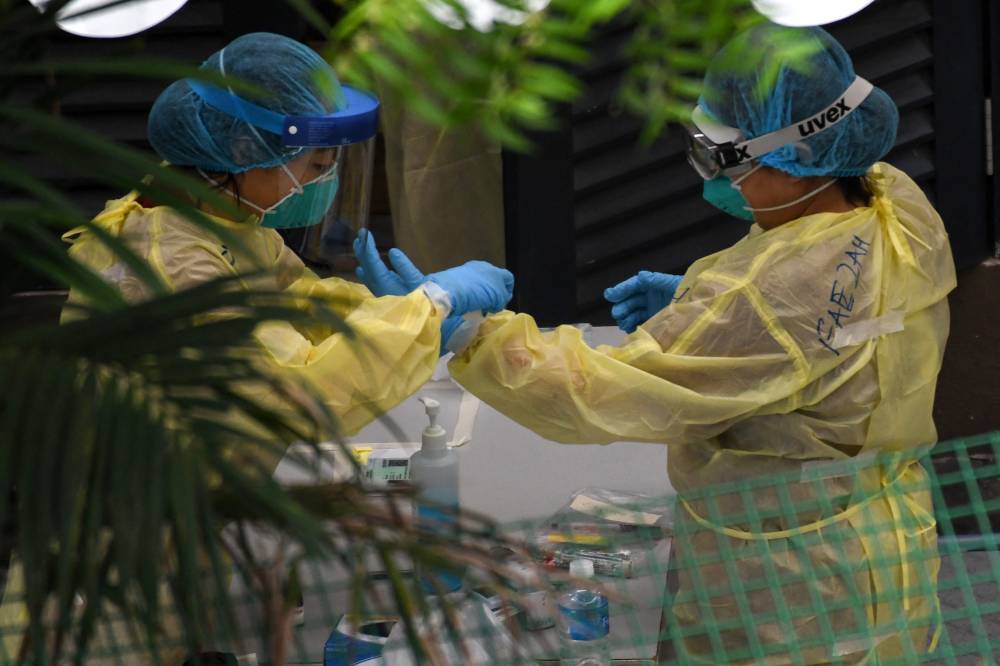Mpox: Singapore to give Jynneos vaccine to healthcare workers, close contacts
A single dose of the vaccine will be administered to close contacts while they are in quarantine, within 14 days of exposure to reduce their risk of the disease.

SINGAPORE - Singapore will administer Jynneos vaccine to healthcare workers and close contacts of confirmed mpox cases.
Singapore’s Ministry of Health (MOH) in a statement Wednesday said Jynneos has been approved for use in Singapore for protection against mpox and smallpox.
"The administration of Jynneos vaccine is part of Singapore public health preparedness measures to respond to the mpox Clade I epidemic," MOH said.
A single dose of the vaccine will be administered to close contacts while they are in quarantine, within 14 days of exposure to reduce their risk of the disease.
Population-wide mpox vaccination is not recommended for now. There is also no vaccination recommendation for travellers to mpox-affected countries.
"Our current supply of Jynneos is projected to be sufficient based on the current vaccination strategy. We will continue to monitor the situation and adjust our vaccination strategy accordingly, as the mpox situation and vaccine supplies evolve globally," MOH said.
MOH has also notified all medical practitioners and healthcare institutions to be vigilant in detecting and immediately reporting all mpox cases to the ministry, especially suspected Clade I infections.
"Suspect cases will be transferred to hospitals for further assessment and treatment, if necessary. Upon confirmation of a Clade I case, MOH will immediately initiate contact tracing,” it said.
Close contacts will be quarantined for 21 days in a designated government quarantine facility following the incubation period observed in Africa.
All suspected Clade I cases identified by primary care providers will be referred to designated hospitals for further assessment and testing.
Adult cases will be sent to the National Centre for Infectious Diseases (NCID), paediatric cases to KK Women’s and Children’s Hospital, and adult-child family dyads to the National University Hospital.
"Cases will be isolated while pending test results. All cases who test positive for Clade I will continue to be isolated in healthcare facilities until they are no longer infectious, to prevent further exposure to the community,” it said.
The treatment of mpox cases is mainly through supportive care to help manage symptoms and prevent complications, while antivirals such as Tecovirimat will be prescribed for cases with severe disease in line with the practices of other public health agencies, the ministry said.
MOH said it will consider implementing masking on public transport and in crowded indoor place should there be evidence of significant respiratory transmission in public areas.
"Based on current evidence that mpox is spread mainly through close physical contact, such as within households, we do not recommend wearing a mask for people who are well,” it added.
MOH, together with the Manpower Ministry and National Environment Agency, are also conducting wastewater testing at migrant worker dormitories and the Onboard Centre as part of its preparedness measures.
Temperature and visual screening have also been put in place at the Onboard Centre, where certain newly-arrived Work Permit holder must attend the Onboard programme.
MOH said there are protocols in place in the event of any mpox cases being detected within the group.
Mpox, caused by the monkeypox virus, has two subtypes - namely Clade I and Clade II.
The World Health Organisation has declared mpox a Public Health Emergency of International Concern (PHEIC) twice - first in May 2022 and again in August 2024.
According to local media, Singapore has detected 14 confirmed cases of mpox this year, all of which are of the less severe Clade II infections. - BERNAMA














